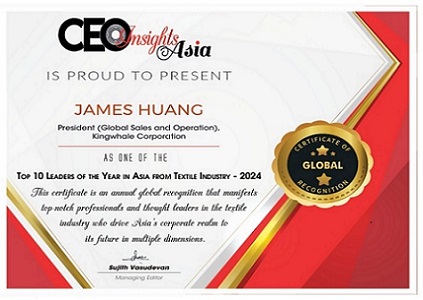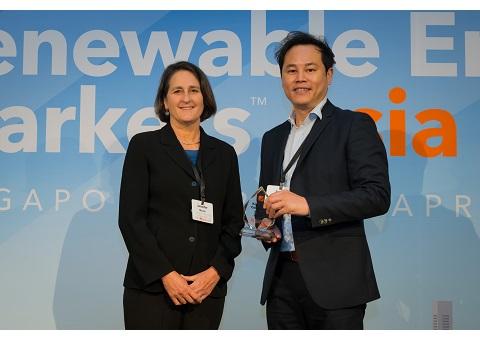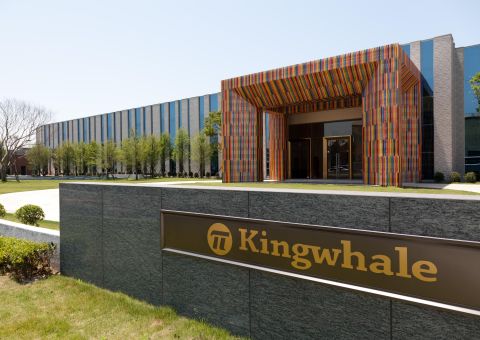News
Latest news
09.Dec.20
Kingwhale Becomes First Asia-Pacific Textile Manufacturer To Join The RE100 Initiative And Commit To 100% Renewable Electricity
Kingwhale Becomes First Asia-Pacific Textile Manufacturer To Join The RE100 Initiative And Commit To 100% Renewable Electricity
TAIPEI — December 9, 2020 — Kingwhale — a responsible manufacturer of performance textiles — has joined the RE100 global initiative, pledging to use 100-percent renewable electricity by 2040. Kingwhale has become the first textile mill in Asia-Pacific to do so.
Renowned for its range of technical knits and fleeces, Kingwhale is a vertically integrated company, controlling the entire production process from fiber spinning to textile manufacturing to garment construction. Moreover, the company has long placed an emphasis on sustainability, with its proprietary technologies resulting in manufacturing practices that minimize energy consumption, reduce waste, and utilize fewer resources.
RE100, led by the international non-profit The Climate Group, states its mission as, “To accelerate change towards zero carbon grids at scale.” The Climate Group brings together large, influential organizations, such as Kingwhale, that are all committed to taking ambitious actions to combat climate change.
The announcement of Kingwhale’s pledge became official via a tweet on December 9, 2020. Posted on the RE100 Twitter account (@theRE100), the tweet proclaimed:
“Our latest Taiwanese member is the textile manufacturer Kingwhale Corporation! Joining #RE100 today, they have committed to sourcing 100% renewable electricity by 2040. We hope more companies will follow their lead and join #RE100. @ClimateGroup @CDP”
As a bluesign® system partner and OEKO-TEX® Standard 100 certified company, Kingwhale is already regarded as an industry leader with regards to its environmental stewardship. In fact, its L.I.T.® (Low Impact Technology) is lauded for its waste reduction and efficiency. This innovative yarn technology modifies the molecular structure of polyester, and thus the dyeing process for these modified fibers requires 60-percent less water for dye preservation, 15-percent fewer dyestuffs to achieve color, and 22-percent less electricity for heating and cooling.
“The RE100 initiative was the next logical step for us,” said James Huang, president of Kingwhale. “We understand quite well that textile production can be very demanding on our natural resources, and that’s why we take sustainability very seriously. For years Kingwhale has set an example for our industry, showing others it’s possible to create great products while minimizing waste and energy consumption, and now I hope others will join us in our commitment to 100-percent renewable electricity.”
Posted December 9, 2020
TAIPEI — December 9, 2020 — Kingwhale — a responsible manufacturer of performance textiles — has joined the RE100 global initiative, pledging to use 100-percent renewable electricity by 2040. Kingwhale has become the first textile mill in Asia-Pacific to do so.
Renowned for its range of technical knits and fleeces, Kingwhale is a vertically integrated company, controlling the entire production process from fiber spinning to textile manufacturing to garment construction. Moreover, the company has long placed an emphasis on sustainability, with its proprietary technologies resulting in manufacturing practices that minimize energy consumption, reduce waste, and utilize fewer resources.
RE100, led by the international non-profit The Climate Group, states its mission as, “To accelerate change towards zero carbon grids at scale.” The Climate Group brings together large, influential organizations, such as Kingwhale, that are all committed to taking ambitious actions to combat climate change.
The announcement of Kingwhale’s pledge became official via a tweet on December 9, 2020. Posted on the RE100 Twitter account (@theRE100), the tweet proclaimed:
“Our latest Taiwanese member is the textile manufacturer Kingwhale Corporation! Joining #RE100 today, they have committed to sourcing 100% renewable electricity by 2040. We hope more companies will follow their lead and join #RE100. @ClimateGroup @CDP”
As a bluesign® system partner and OEKO-TEX® Standard 100 certified company, Kingwhale is already regarded as an industry leader with regards to its environmental stewardship. In fact, its L.I.T.® (Low Impact Technology) is lauded for its waste reduction and efficiency. This innovative yarn technology modifies the molecular structure of polyester, and thus the dyeing process for these modified fibers requires 60-percent less water for dye preservation, 15-percent fewer dyestuffs to achieve color, and 22-percent less electricity for heating and cooling.
“The RE100 initiative was the next logical step for us,” said James Huang, president of Kingwhale. “We understand quite well that textile production can be very demanding on our natural resources, and that’s why we take sustainability very seriously. For years Kingwhale has set an example for our industry, showing others it’s possible to create great products while minimizing waste and energy consumption, and now I hope others will join us in our commitment to 100-percent renewable electricity.”
Posted December 9, 2020
Other
Latest news
27.Nov.24
Top 10 Leaders of the Year in Asia from Textile Industry - 2024
Latest news
27.Apr.23
Kingwhale Wins 2023 Renewable Energy Markets™ Asia Awards
Latest news
18.Aug.22






